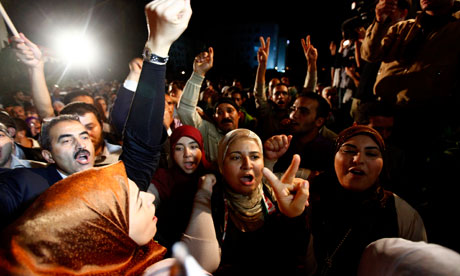Islamist groups have had to face a stark reality: conform to the changing environment or fade into irrelevance

Supporters of the Ennahda movement celebrate last month after winning more than 40% of seats in Tunisia's election. Photograph: Anis Mili/Reuters
Early excitement induced by the arrival of the Arab spring has recently been dampened by the emergence of Islamist parties as key beneficiaries. With Ennahda taking the lion's share of the votes in Tunisia and the Muslim Brotherhood expected to do the same in Egypt, many are beginning to ask questions about the direction in which the region is heading.
However, success for traditional and well organised Islamist parties does not necessarily translate into success for Islamism. What we are really witnessing is the emergence of post-Islamism in the Arab world. Post-Islamism is the position that an increasing number of the more moderate Islamist parties are arriving at after being exposed to the reality of politics.
The AKP in Turkey paved the way for this by demonstrating, in practice, how parties rooted in Islamist ideology are only embraced by the masses when they shed dogma and idealism in favour of pragmatism and compromise. There are early indications that Ennahda in Tunisia is going down this path with the Brotherhood in Egypt not too far behind. Ennahda has already stated that it won't seek to ban alcohol or impose a version of Islamic banking.
Post-Islamist parties tend to retain an emotional attachment to faith and seek to create a cultural shift towards Islamic principles (as defined by them) rather than imposing a prefabricated political model deemed to be an Islamic one. In other words, they still envisage a society where Islam guides public policy but without dictating it in a dogmatic and dictatorial fashion. Post-Islamists are Islamists mugged by reality.
Globalisation, easy exchange of information and the emergence of multi-faceted identities have made Islamism seem unworkable and anachronistic. Islamist groups have therefore had to face a stark reality: conform to the changing environment or fade into irrelevance. Some have chosen to remain dogmatic while others have begun to slowly embrace pluralism, equality, universal human rights and religious moderation, driven by the need to remain relevant to their increasingly sophisticated target audience.
This has not been an easy adjustment. While increasing their appeal on the outside, it has made life a little more difficult on the inside. The more traditional elements are struggling to remain on board and in Egypt the Brotherhood has had to deal with several high-profile defections in recent months.
The emergence of post-Islamism should be welcomed because it signals the failure of classical Islamism and teaches us that most people in the region are not motivated by ideology, instead preferring practical politics. In the long-term post-Islamism will also weaken the more extreme elements who are still dreaming of creating a totalitarian theocracy.
Political parties may still use Islam as an excuse to deflect criticism of their policies and seek to further entrench certain outmoded cultural practices and attitudes. Nevertheless, the shift towards democratic culture in the region should give us all cause for hope.
Democracy can certainly bring unsavoury elements into power but it can also remove them. Democratic culture is the best way to prevent abuses of power and entrench transparency, accountability and the rule of law.
From a western policy perspective, this is a much better way of preventing the emergence of theocratic totalitarianism. Rather than supporting unpopular autocrats we should support democratisation and have faith in its ability to transform societies for the better.
Fears of Arab countries adopting an "Iranian-style theocracy" have been voiced in some circles but early indications suggest this is highly unlikely in places like Egypt, Tunisia or Libya – especially since the uprisings were not led by Islamist forces in the first place.
In addition, none of these countries can afford to isolate the international community; they are too reliant on external investment, tourism and expertise. It is also unlikely that Islamist groups will win outright majorities in elections – meaning that coalitions with secular, liberal and nationalist elements will act as moderating influences.
Post-Islamism should be viewed as a phase that will characterise Middle Eastern politics for the next couple of decades at least. It shouldn't be viewed as a danger but rather an opportunity to open up a dialogue. During this period there will be many challenges but hopefully the adoption of a democratic framework with a wide range of political voices operating within it is the best chance a troubled region has to arrive at a better place.
Source: http://www.guardian.co.uk/commentisfree/2011/nov/12/post-islamism-middle-east-democracy?INTCMP=SRCH
Aucun commentaire:
Enregistrer un commentaire